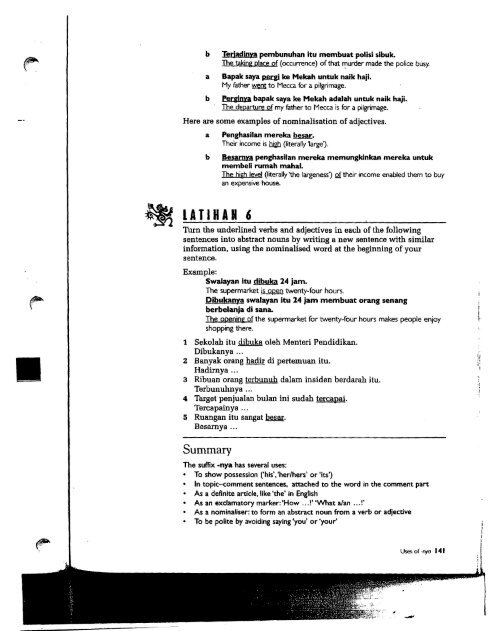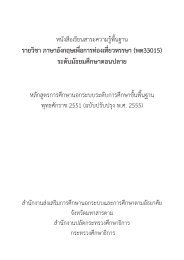bahasa indonesia
djenar-2003-a-students-guide-to-indonesian-grammar-oxford
djenar-2003-a-students-guide-to-indonesian-grammar-oxford
- No tags were found...
Create successful ePaper yourself
Turn your PDF publications into a flip-book with our unique Google optimized e-Paper software.
a<br />
b<br />
Teriadinya pembunuhan itu membuat polisi sibuk.<br />
The takine place of (occurrence) of that murder made the police busy.<br />
Bapak saya pernj ke Mekah untuk naik haji.<br />
My father w a to Mecca for a pilgrimage.<br />
Pertzin~a bapak saya ke Mekah adalah untuk naik haji.<br />
The departure of my father to Mecca is for a pilgrimage.<br />
Here are some examples of nominalisation of adjectives.<br />
a<br />
b<br />
Penghasilan mereka besar.<br />
Their income is &$J (literally 'large').<br />
Besarnya penghasilan mereka mernungkinkan mereka untuk<br />
membeli rumah mahal.<br />
The hi~h level (literally 'the largeness') g[their income enabled them to buy<br />
an expensive house.<br />
-4<br />
Turn the underlined verbs and adjectives in each of the following<br />
sentences into abstract nouns by writing a new sentence with similar<br />
information, using the nominalised word at the beginning of your<br />
sentence.<br />
Example :<br />
Swalayan itu dibuka 24 jam.<br />
The supermarket is open twenty-four hours.<br />
Dibukanva swalayan itu 24 jam membuat orang senang<br />
berbelanja di sana<br />
The openine of the supermarket for twenty-four hours makes people enjoy<br />
shopping there.<br />
1 Sekolah itu dibuka oleh Menteri Pendidikan.<br />
Dibukanya . . .<br />
2 Banyak orang hadir di pertemuan itu.<br />
Hadirnya . . .<br />
3 Ribuan orang terbunuh dalarn insiden berdarah itu.<br />
Terbunuhnya . . .<br />
4 Target penjualan bulan ini sudah terca~ai.<br />
Tercapainya . . .<br />
5 Ruangan itu sangat besar.<br />
Besarnya . . .<br />
Summary<br />
The suffix -nya has several uses:<br />
To show possessian ('his','her/hersl or 'its')<br />
In topic-comment sentences, attached to the word in the comment part<br />
As a definite article, like 'the' in English<br />
As an exclamatory marker:'How . . .!' 'What a/an . . .!'<br />
As a nominaliser: to form an abstract noun from a verb or adjective<br />
To be polite by avoiding saying 'you' or 'your'<br />
Uses of -nyo 1 4 1<br />
i I



